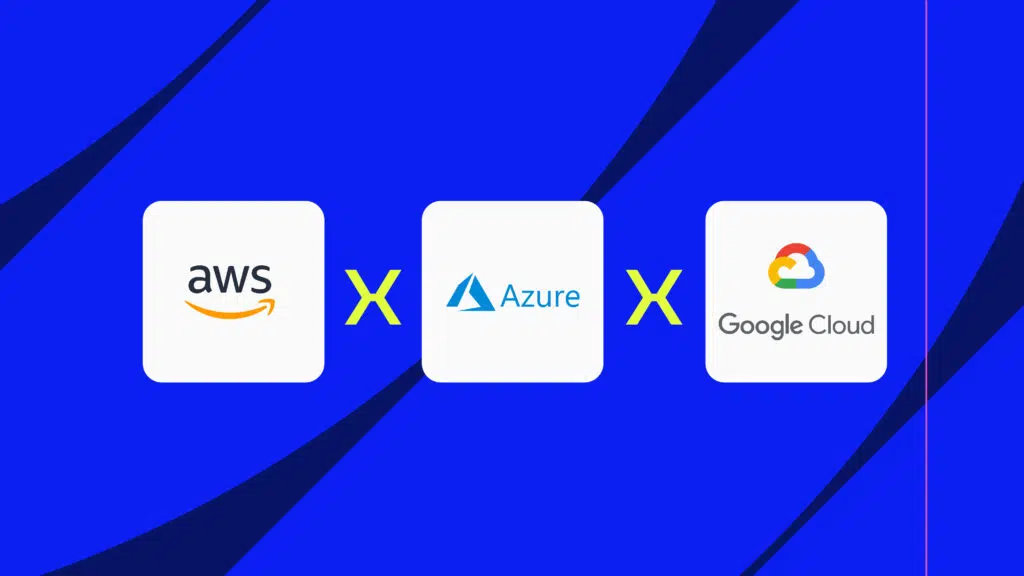We already know that the cloud offers numerous advantages for companies . And in order to attract customers, the Cloud Computing industry has been reducing prices, increasing the storage limit and offering additional services. So can you compare cloud services?
In practice, the cloud war in Brazil is disputed by giant technology companies, the main ones being:
- Amazon Web Services (AWS);
- Google Cloud;
- Microsoft Azure;
- Oracle Cloud.
They try to conquer the market by creating as many benefits as possible at a very low price. But will this dispute bring benefits to the customer? Will it ever come to an end?
To better detail these options and how this dispute takes place in the market, we have prepared this content that will provide a complete overview of this dispute. Find out all the details below!
The Path to Leadership in Cloud Solutions
If we compare the prices of companies' cloud storage services, we won't find such significant differences. All try to keep values at competitive levels .
This path to market leadership is called the “race to zero,” where prices drop and storage limits go up. But why does this happen? One of the reasons, in addition to strong competition from major players, is that computer storage continues to be sought after. If the cloud service becomes expensive, consumers may still prefer physical file storage.
And anything goes to conquer the market. Amazon wants to increase its revenue by gaining more customers by adding services for which users are willing to pay. Microsoft and Google, on the other hand, will maintain prices corresponding to those of AWS , in addition to adding other services and applications of their own.
All of this is great news for those who depend on the cloud, as each organization can analyze and understand what will provide the best return.
But after all, what is the best service?
Choosing a Cloud Computing has become complicated in recent years. The companies offer a range of options for us to choose according to our needs. Overall, each vendor has its strengths and weaknesses, and none are better than the others.
However, depending on your needs, a service may better suit your profile. It is up to the IT team to find the most viable solution , taking into account criteria such as:
- the use of storage;
- durability;
- performance;
- availability;
- capacity cost;
- monitoring and access;
- lifecycle management.
To better understand the differences and what each one can offer differently, let's detail some points about each of the 4 main Cloud technologies.
Amazon Web Services (AWS)
Amazon follows current industry standards, with advanced technologies and very secure installations. But by pricing its cloud products extremely cheaply, Amazon has been able to provide affordable and scalable services for everyone from the newest start-up to a large, market-leading company.
To get an idea, Amazon doubled its net profit in the 2nd quarter of 2020, reaching US$ 5.2 billion. With the expansion of home office work, the Amazon cloud service alone had a 29% increase in revenue.
Microsoft Azure
Microsoft Azure the , improved its storage integration, applying its front-end . She works with the vision that organizations can create secure and future-proof cloud solutions by uniting the use of cloud space with their applications and tools.
It is also important to highlight the enormous proximity to the open-source community, especially after the acquisition of Git Hub in 2018 .
Google Cloud
Google, which was late to the market, now stands out with low prices. Many adopt its service just for the brand recognition, but the truth is that Google Cloud has some competitive strengths against its competitors, such as the simplified deployment of applications.
But Amazon, followed by Microsoft, has a larger share of the overall market and (for now) a broader range of services.
Oracle Cloud
Oracle has a global network of data centers set up to run its cloud offerings. The company uses the service called Oracle Cloud to provide the applications, server access, storage and processing in the cloud for companies.
While not first to market, Oracle has been in the cloud market long enough to get the full picture of its global presence and services portfolio. Featuring high-speed backbones connecting its cloud data centers, its latest design is built around high-speed 25-gigabit Ethernet links.
Will this war ever end?
Each provider tries to ensure that no user migrates to another provider just because of features that one has and the other doesn't. Some companies give small advantages to one application profile, and others offer a small advantage to another profile . This means that this war will not end in the coming years.
The tendency is for these providers to be like a hydroelectric plant, regardless of which provider each user uses: processing is very similar and the difference is in the additional features that characterize one service or another. And as time goes on, the industry will continue to cut prices.
In the end, you can't say there's only one winner when comparing cloud services like AWS vs. Google Cloud vs. Microsoft Azure vs. Oracle Cloud.
The common factor among all of them is that they all invest billions annually to improve their services. And that certainly should provide innovations year after year. Who wins with this are the end users and companies with high demand for space and speed in the cloud environment.
Want to know more about the future of Cloud Computing? Keep following our blog ! Also be sure to check out Skyone's solutions and cloud services . Whether your company is small or large, Skyone will certainly present the perfect solution with lower costs and efficient applicability!




